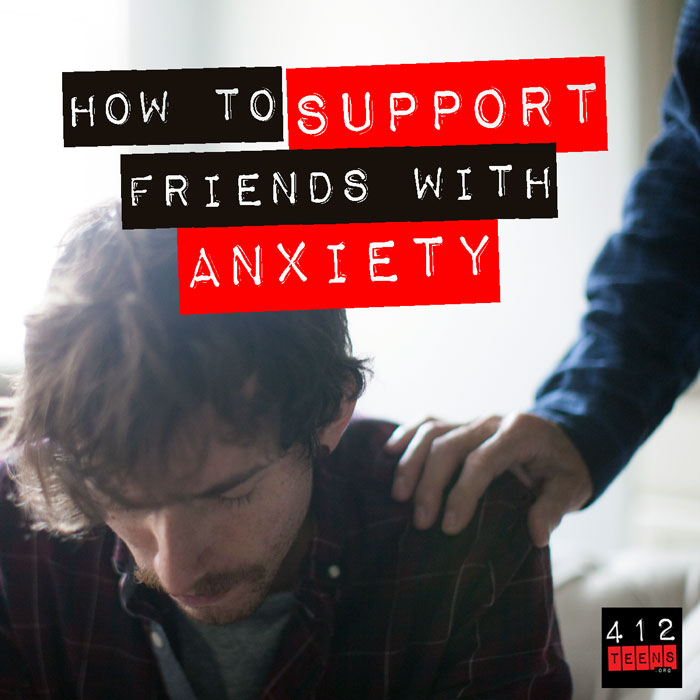How to Support a Friend with Anxiety

How can I be a good friend to someone who has anxiety? This is such a beautiful question. And the answer is both extremely simple and infinitely complex.
Short Answer: Simply love your friend.
Your relationship with a friend who suffers from anxiety may be just like any other on most days. But when their anxiety flares, realize that how your friend needs to experience love may be different than you think. It'll likely be different than what you yourself would want or need.
During a period of extreme anxiety, the biggest help you can give your friend is to listen to what they're saying. Discover what they need from you in that moment.
From my experience, for many people, their needs can be boiled down to three things: patience, presence, and communication.
Have Patience
If you have never struggled with anxiety or depression, one of the hardest things to understand is that anxiety can be utterly crippling. Debilitating anxiety can make it hard to think, process feelings logically, and sometimes, even cause physical impairments, like making it hard to breathe.
A person struggling with anxiety isn't necessarily ignoring their self-worth. They aren't disregarding the real truths they know and recognize on any other day. They aren't trying to avoid trusting in God. Rather, they're caught up in the grip of something they literally cannot control. For many of them, this is as real as an asthma attack, a sugar crash, or a serious migraine. They can't prevent the panic attacks from coming on or stop the emotions and worries racing through them—any more than you could control a heart attack.
Don't Try to "Fix" Things
Our gut instincts may be to try to FIX what we perceive to be the problems and stop the anxious thoughts, but I urge you to resist that gut reaction. Trying to "fix" someone's mental illness or "fix" when their mental health tanks will not work for two main reasons:
- We can't actually fix anything ourselves. That's God's job to complete (Psalm 103).
- We might inadvertently ADD to their anxiety by trying (and failing) to fix their problems.
The best thing you can do for your friend when they're suffering from anxiety is to patiently wait with them. Stay with them in the moment. Pray for them (1 Thessalonians 5:14-17). Don't try to fix things and, unless asked, don't offer solutions to "make everything better"—especially their raging emotions.
Be Present
Sometimes, your friend will just need to know they have a safe place to be themselves. A stable, constant friend. A lode stone. If your friend allows you to be this for them, that is a priceless gift. Even if you aren't that close to each other, you can simply be a good friend. Anxiety is very isolating, and many people find it easier to push everyone away instead of trying to combat their anxieties enough to trust themselves and other people.
Julia Brennan has a beautiful song about fighting things no one else can see and understand. In her song, she asks for her angels to please stay with her, to help her fight. Just being with someone, sitting with them, accepting them in their current state—be that good or bad—is one of the best things you can do (Hebrews 10:24). When Jesus suffered, He asked only that His friends stay awake with Him for one hour (Matthew 26:36-38). There may be times when your friend will need this.
But there will be lots of good moments too. Don't forget that, during the better days, you should be just as attentive as on the bad days. Be a constant friend, a true companion. Laugh when your friend laughs, cry when your friend cries (Romans 12:15; 1 Corinthians 12:26). And let your friend do the same for you.
Communicate Clearly
This is true of any friendship, but the importance of clear communication in a relationship with someone who has anxiety is paramount. They may need you to repeat things they already know in order to remind them of the truth and reality. They may need to tell you things that they're afraid to tell you.
Work at keeping communication open, reserving judgment, and exercising compassion. Make yourself a safe space. Learn to communicate effectively. Gently discover a deeper understanding about where they're coming from. Communication is a two-way street. Be sure you give them loving feedback as well as sharing your own heart. Otherwise, the relationship is hollow.
Allow them to be authentic, to express themselves on their messy days as well as their good ones. Remind them of the truths they know when they need it, and enjoy the blessing of a good friend when they return the favor.
Practice Genuine Friendship
Ultimately, any friendship is a relationship between two broken people. Every relationship has its own flavor, its own dynamic, and its own conflicts. I have a few friends with differing levels of anxiety, and each one is a bit different in how I approach them. But for each person, I try very hard to listen to what they need, to see if they feel safe with me, and show them unconditional love.
Most importantly, in the end, remember that your friend is so much more than their anxiety. They are a creation of God, whom He loves wholeheartedly, and who has been put into your life for a reason.
"Two are better than one, because they have a good reward for their toil. For if they fall, one will lift up his fellow. But woe to him who is alone when he falls and has not another to lift him up!" —Ecclesiastes 4:9-10
ALSO SEE:
- How can I overcome anxiety?
- How can I overcome social anxiety?
- How to Do a Mental Health Check
- What does the Bible say about mental illness?
- What does the Bible say about mental health?
- What does the Bible say about depression?
- Is it a sin to be depressed?
- What does the Bible say about stress and worry?
- What does the Bible say about sadness?
- What does the Bible say about panic attacks?
- Can a Christian see a psychologist, psychiatrist, or counselor?
- How do I choose a good Christian counselor?
- Can a Christian take mental health meds?
- What is religious OCD?
- Jenna's Story
- Langston's Story


TL;DR
The best thing you can do for your friend when they're suffering from anxiety is to patiently wait with them. Pray for them (1 Thessalonians 5:14-17). Don't try to fix things and, unless asked, don't offer solutions to "make everything better"—especially their raging emotions. Work at keeping communication open, reserving judgment, and exercising compassion. Make yourself a safe space. Your friend is so much more than their anxiety. They are a creation of God, whom He loves wholeheartedly, and who has been put into your life for a reason.

Writer: Brianna
Brianna is a manager at her favorite childhood bookstore. She is likely to be found curled up with a book and her black cat, Bear, talking to a stranger, dancing outside in a thunderstorm, singing Disney songs while making cookies, or snuggling her best friend's baby while drinking coffee. Her heart is fueled by the desire to help people find their unique wings and use them in whatever capacity God has created them for. She is passionate about seeing and finding Christ in the secular world wherever she can.
